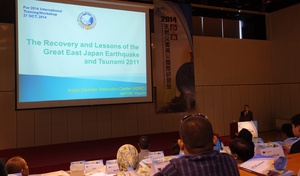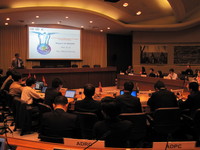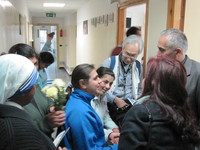Taipei, Taiwan (October 27-31, 2014)
 ADRC had actively supported the 2014 International Training Workshop (ITW) which was organized by the National Science and Technology Center for Disaster Reduction (NCDR), 27-31 October 2014 at the NCDR Training Center, Taipei, Taiwan. The workshop was aimed at sharing experiences and lessons on post-disaster recovery, especially from countries that experienced mega-disasters.
ADRC had actively supported the 2014 International Training Workshop (ITW) which was organized by the National Science and Technology Center for Disaster Reduction (NCDR), 27-31 October 2014 at the NCDR Training Center, Taipei, Taiwan. The workshop was aimed at sharing experiences and lessons on post-disaster recovery, especially from countries that experienced mega-disasters.
Along with speakers from various organizations and countries, ADRC had shared experiences on post-disaster recovery. In particular, ADRC Executive Director Mr. Kiyoshi Natori presented the "Recovery and Lessons from the Great East Japan Earthquake and Tsunami of 2011" highlighting the challenges on post-disaster recovery and how these challenges were addressed, including applying the lessons from past disasters as well as integrating the emerging lessons from current disasters such as considering the "wisdom of local community" in disaster risk reduction. Additionally, a researcher at ADRC also shared some of the existing "Tools and Guidance in Building Back Better" emphasizing ADRC's experience in disseminating knowledge on recovery.
ADRC's presentations had contributed in achieving one of the key objectives of the workshop, which is to collect, analyze, and apply trans-boundary knowledge and lessons on recovery. Based on the presentations from countries in Asia and the Pacific as well as Latin America, the elements for organizing effective recovery were identified - especially in the areas of infrastructure/housing reconstruction, livelihood revitalization, and psychosocial wellness. The sharing of knowledge and experiences was reinforced with a one-day field visit to the Chi‐Chi Earthquake Museum (9.21 Museum) and Nantou County, which showcased the recovery efforts from the 1999 earthquake and the recovery of Sacred Wood Community from the 2009 Typhoon Morakot, respectively.
The 2014 ITW was an opportunity to forward collaboration and interdisciplinary discussions on post-disaster recovery. It explored actions that promote further investment in DRR and emergency preparedness through development of new technology and upgrading of infrastructures to make them more resilient.
(2014/11/7 14:40)



